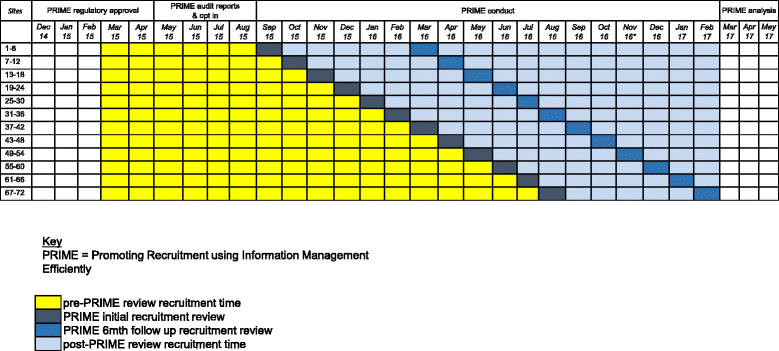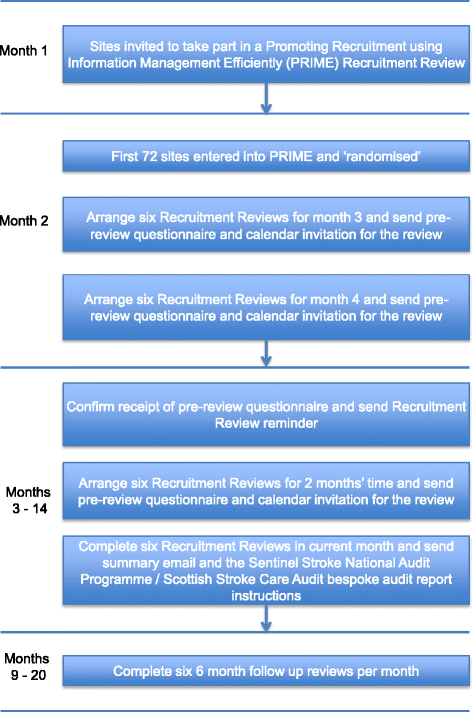Promoting Recruitment using Information Management Efficiently (PRIME): study protocol for a stepped-wedge cluster randomised controlled trial within the REstart or STop Antithrombotics Randomised Trial (RESTART)
- PMID: 28245843
- PMCID: PMC5331676
- DOI: 10.1186/s13063-016-1692-7
Promoting Recruitment using Information Management Efficiently (PRIME): study protocol for a stepped-wedge cluster randomised controlled trial within the REstart or STop Antithrombotics Randomised Trial (RESTART)
Erratum in
-
Erratum to: Promoting Recruitment using Information Management Efficiently (PRIME): study protocol for a stepped-wedge cluster randomised controlled trial within the REstart or STop Antithrombotics Randomised Trial (RESTART).Trials. 2017 Mar 28;18(1):146. doi: 10.1186/s13063-017-1906-7. Trials. 2017. PMID: 28351422 Free PMC article. No abstract available.
-
Correction to: Promoting Recruitment using Information Management Efficiently (PRIME): study protocol for a steppedwedge cluster randomised controlled trial within the REstart or STop Antithrombotics Randomised Trial (RESTART).Trials. 2019 Jul 17;20(1):438. doi: 10.1186/s13063-019-3518-x. Trials. 2019. PMID: 31315649 Free PMC article.
Abstract
Background: Research into methods to boost recruitment has been identified as the highest priority for randomised controlled trial (RCT) methodological research in the United Kingdom. Slow recruitment delays the delivery of research and inflates costs. Using electronic patient records has been shown to boost recruitment to ongoing RCTs in primary care by identifying potentially eligible participants, but this approach remains relatively unexplored in secondary care, and for stroke in particular.
Methods/design: The REstart or STop Antithrombotics Randomised Trial (RESTART; ISRCTN71907627) is an ongoing RCT of secondary prevention after stroke due to intracerebral haemorrhage. Promoting Recruitment using Information Management Efficiently (PRIME) is a stepped-wedge cluster randomised trial of a complex intervention to help RESTART sites increase their recruitment and attain their own target numbers of participants. Seventy-two hospital sites that were located in England, Wales or Scotland and were active in RESTART in June 2015 opted into PRIME. Sites were randomly allocated (using a computer-generated block randomisation algorithm, stratified by hospital location in Scotland vs. England/Wales) to one of 12 months in which the intervention would be delivered. All sites began in the control state. The intervention was delivered by a recruitment co-ordinator via a teleconference with each site. The intervention involved discussing recruitment strategies, providing software for each site to extract from their own stroke audit data lists of patients who were potentially eligible for RESTART, and a second teleconference to review progress 6 months later. The recruitment co-ordinator was blinded to the timing of the intervention until 2 months before it was due at a site. Staff at RESTART sites were blinded to the nature and timing of the intervention. The primary outcome is the total number of patients randomised into RESTART per month per site and will be analysed in a negative binomial generalised linear mixed model. PRIME began in September 2015. The last intervention was delivered in August 2016. Six-month follow-up will be complete in February 2017.
Discussion: The final results of PRIME will be analysed and disseminated in 2017.
Trial registration: The PRIME study was registered in the Northern Ireland Hub for Trials Methodology Research Studies Within a Trial (SWAT) repository (SWAT22) on 23 December 2015.
Keywords: Audit; Cluster randomised trial; Methodology; Recruitment; Stepped-wedge trial; Study within a trial.
Figures
Similar articles
-
Promoting Recruitment using Information Management Efficiently (PRIME): statistical analysis plan for a stepped wedge cluster randomised trial within the REstart or STop Antithrombotics Randomised Trial (RESTART).Trials. 2017 Mar 1;18(1):94. doi: 10.1186/s13063-017-1840-8. Trials. 2017. PMID: 28253897 Free PMC article. Clinical Trial.
-
The REstart or STop Antithrombotics Randomised Trial (RESTART) after stroke due to intracerebral haemorrhage: study protocol for a randomised controlled trial.Trials. 2018 Mar 5;19(1):162. doi: 10.1186/s13063-018-2542-6. Trials. 2018. PMID: 29506580 Free PMC article.
-
Promoting Recruitment using Information Management Efficiently (PRIME): a stepped-wedge, cluster randomised trial of a complex recruitment intervention embedded within the REstart or Stop Antithrombotics Randomised Trial.Trials. 2017 Dec 28;18(1):623. doi: 10.1186/s13063-017-2355-z. Trials. 2017. PMID: 29282142 Free PMC article. Clinical Trial.
-
Folic acid supplementation and malaria susceptibility and severity among people taking antifolate antimalarial drugs in endemic areas.Cochrane Database Syst Rev. 2022 Feb 1;2(2022):CD014217. doi: 10.1002/14651858.CD014217. Cochrane Database Syst Rev. 2022. PMID: 36321557 Free PMC article.
-
Longer-term health and social care strategies for stroke survivors and their carers: the LoTS2Care research programme including cluster feasibility RCT.Southampton (UK): NIHR Journals Library; 2021 Mar. Southampton (UK): NIHR Journals Library; 2021 Mar. PMID: 33819000 Free Books & Documents. Review.
Cited by
-
Promoting Recruitment using Information Management Efficiently (PRIME): statistical analysis plan for a stepped wedge cluster randomised trial within the REstart or STop Antithrombotics Randomised Trial (RESTART).Trials. 2017 Mar 1;18(1):94. doi: 10.1186/s13063-017-1840-8. Trials. 2017. PMID: 28253897 Free PMC article. Clinical Trial.
-
Correction to: Promoting Recruitment using Information Management Efficiently (PRIME): study protocol for a steppedwedge cluster randomised controlled trial within the REstart or STop Antithrombotics Randomised Trial (RESTART).Trials. 2019 Jul 17;20(1):438. doi: 10.1186/s13063-019-3518-x. Trials. 2019. PMID: 31315649 Free PMC article.
-
Erratum to: Promoting Recruitment using Information Management Efficiently (PRIME): study protocol for a stepped-wedge cluster randomised controlled trial within the REstart or STop Antithrombotics Randomised Trial (RESTART).Trials. 2017 Mar 28;18(1):146. doi: 10.1186/s13063-017-1906-7. Trials. 2017. PMID: 28351422 Free PMC article. No abstract available.
-
Enhancing Recruitment Using Teleconference and Commitment Contract (ERUTECC): study protocol for a randomised, stepped-wedge cluster trial within the EFFECTS trial.Trials. 2018 Jan 8;19(1):14. doi: 10.1186/s13063-017-2367-8. Trials. 2018. PMID: 29310679 Free PMC article.
-
The REstart or STop Antithrombotics Randomised Trial (RESTART) after stroke due to intracerebral haemorrhage: study protocol for a randomised controlled trial.Trials. 2018 Mar 5;19(1):162. doi: 10.1186/s13063-018-2542-6. Trials. 2018. PMID: 29506580 Free PMC article.
References
Publication types
MeSH terms
Substances
Grants and funding
LinkOut - more resources
Full Text Sources
Other Literature Sources
Medical



